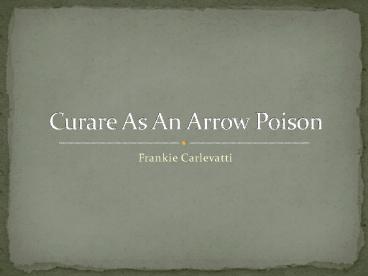Frankie Carlevatti - PowerPoint PPT Presentation
1 / 17
Title:
Frankie Carlevatti
Description:
... comes from the Indian words woorari, woorali and urari, all meaning poison. ... The vine has small greenish-white flowers with separate male and female parts ... – PowerPoint PPT presentation
Number of Views:105
Avg rating:3.0/5.0
Title: Frankie Carlevatti
1
Curare As An Arrow Poison
- Frankie Carlevatti
2
Curare Overview
- Curare is actually a name for the thick poisonous
resin made from a plant. - Curare is made from plants spp Strychnos.
- Strychnos Toxifera.
- Curare can also be made from the vine
Chondodendron tomentosum.
3
Overview Cont
- Curare comes from the Indian words woorari,
woorali and urari, all meaning poison. - There are also different names for the way Curare
is prepared. - Pot Curare
- Earthenware jars
- Tube Curare
- Bamboo
- Calabash Curare
- Gourds
4
Strychnos
- Spp Strychnos
- These spp of plants are native to South America,
Southeast Asia and Indonesia. - These spp of plants yield alkaloids which can be
used as poison, such as - Curarine
- Strychnine
- Toucine
- Strychnine was once used as a nervous system
stimulant but has been replaced by synthetic
drugs.
5
Chondodendron
- Chondodendron is native to South America.
- In the preparation of Curare the bark and stems
of this plant are used. - The Chonodendron plant also contains alkaloids
such as tubocurarine and tubocurarine
chloride.
http//www.ntbg.org/pwr/resources/photos/1408.jpg
6
Chondodendron
- The Chondodendron is a vine that grows in the
canopy of the rainforest of South America. - It has large alternating heart shaped leaves that
can be four to eight inches long - The top of the leaves are smooth and green with
deep set veins, the underside is hairy and white. - The vine has small greenish-white flowers with
separate male and female parts that produce small
white oval shaped fruit.
7
Curare History
- The first western witness to the poison and how
it is prepared was Alexander von Humboldt in
1807. - From 1811-1812 Sir Benjamin Collins Brody
experimented with curare and found that curarized
animals would recover if artificial respiration
was maintained - Robert Hermann Scholburgk identified the plant
used in production.
8
History Cont..
- In 1825 Charles Waterton kept a curarized animal
alive by crude artificial ventilation with a
bellows through a tracheostomy. - Waterton is also credited with bringing curare to
Europe.
9
Curare Production
- To make curare the bark is scraped off young
plants. - The scrapings are then taken and boiled for two
or three days. - This liquid is strained and evaporated, the
viscous paste that is left is curare. - The poison can also be made by scraping bark into
a banana leaf, percolating water through it and
collecting the condensate. - The poison that is created affects neuromuscular
transmission.
10
Uses for Curare
- The poison is used by Amazonian Indians to hunt.
- The tip of a dart is dipped in the curare and
then blown from a tube at an animal. - Some tribes had regional monopolies on curare
production which represented wealth. - Curare was too expensive and scarce to use in
warfare. - The potency of the curare would sometimes be
tested by counting how many leaps a frog took
after being pricked . - Curare kills by muscle paralysis.
11
Curare Darts
- http//imagecache2.allposters.com/images/pic/LPIPO
D01/BN13924_12Poisonous-Curare-Darts-and-Pucunas-
Blowgun-of-Yagua-Indian-Tribe-Peru-Posters.jpg
http//images.google.com/imgres?imgurlhttp//www.
asahq.org/images/albinCurare.jpgimgrefurlhttp//
www.asahq.org/Newsletters/2005/10-05/albin10_05.ht
mlh357w353sz47hlenstart15um1tbnid1m9
yHgWYnJA8eMtbnh121tbnw120prev/images3Fq3D
curare26um3D126hl3Den26sa3DN
12
Uses cont
- The rate the curare takes affect depends on the
size of the animal. - One to two minutes for birds.
- Up to ten minutes for small mammals.
- Up to twenty minutes for large mammals.
- Curare must be administered into the blood stream
because the compound is too large to be absorbed
through the stomach - This allows the tribes to eat the meat they hunt
without being poisoned.
13
Other uses
- The root of the chondodendron vine can also be
used for medicinal purposes. - Use of the root internally can increase
urination, reduce pain, relax muscles, reduce
fever, promote menstruation, treat edema and
kidney stones. - Externally the root can be used to treat bruises
and contusions and the leaves were crushed up to
treat snake bites.
14
Modern uses
- The addition of curare to an anesthetic can
create extreme muscle relaxation comparable to a
spinal anesthetic. - The addition of curare allows for a fast recovery
and reduces the risk of postoperative
complications such as pneumonia - It is sometimes used to treat paralysis due to
tetanus which causes uncontrollable muscle
contractions throughout the body.
15
Uses cont
- Tubocurarine is being evaluated for its use in
blocking serotonin, reducing vomiting,
alleviating drug withdrawal symptoms and
anti-anxiety effects. - Tubocurarine can be used with shock therapy to
lessen the risk of bone fracture.
http//images.google.com/imgres?imgurlhttp//www.
asahq.org/images/albinCurare.jpgimgrefurlhttp//
www.asahq.org/Newsletters/2005/10-05/albin10_05.ht
mlh357w353sz47hlenstart15um1tbnid1m9
yHgWYnJA8eMtbnh121tbnw120prev/images3Fq3D
curare26um3D126hl3Den26sa3DN
16
Interesting Facts
- Curare as been mentioned in modern television
shows. - Heroes, where sylar was drugged with curare when
drinking Chai. - MASH, Dr. Winchester accidentally injects a
pacient with curare and stops their breathing. - Batman Beyond, episode title named A Touch of
Curare - American Dad, two characters jokingly shoot each
other with darts and temporarily paralyze
eachother.
17
sources
- http//www.britannica.com/eb/article-9028243/curar
e - http//www.botgard.ucla.edu/html/botanytextbooks/e
conomicbotany/Curare/ - http//www.blueplanetbiomes.org/curare.htm
- http//en.wikipedia.org/wiki/Curare
- Ogorzaly, Simpson. Economic Botany. New York,
2001.































